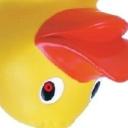Yahoo Answers is shutting down on May 4th, 2021 (Eastern Time) and beginning April 20th, 2021 (Eastern Time) the Yahoo Answers website will be in read-only mode. There will be no changes to other Yahoo properties or services, or your Yahoo account. You can find more information about the Yahoo Answers shutdown and how to download your data on this help page.
Trending News
Could a human being be the size of an ant?
8 Answers
- Anonymous2 years agoFavorite Answer
Unlikely. Humans are mammals, and no mammal has ever been found that is that small. There are several reasons for that. One, our internal organs may not be able to scale down to such a small size. Another reason is that the smaller an object, the more surface area per unit volume it has. Since heat loss is proportional to surface area, it means such a small animal will gain or lose heat very quickly. Since mammals generate body heat internally to keep our temperatures high, that means we can lose heat quickly to the environment if the environment is colder than our body temperature, and that means our hearts would have to beat very fast to keep up. Mammals the size of a mouse has a heart rate of 500 beats per minute, and they only live 2-3 years maximum as a result. A mammal the size of an ant may need to have a heart rate that beats thousands of times a minute, and the life span of such an animal would be a fraction of a year. That would not allow many animals enough time to grow and reproduce before dying.
- 2 years ago
In the movies, yes. Or standing next to a dinosaur, then in comparison, yes,
- Ender772Lv 72 years ago
we really have no way of knowing how big the universe is...it could be the size of a tennis ball for all we know...
- How do you think about the answers? You can sign in to vote the answer.
- Anonymous2 years ago
No......because of gravity
- ?Lv 72 years ago
No. Ants don't exactly have brains. (They have something similar, but much simpler.)
- billrussell42Lv 72 years ago
no. there is an Inverse-square law (if I have the right term) that controls proportions as you increase or decrease size. The human body as is would not function at that size. The brain would have much less capacity, the muscles would be oversized, etc.
look at the legs on an elephant as an example.






